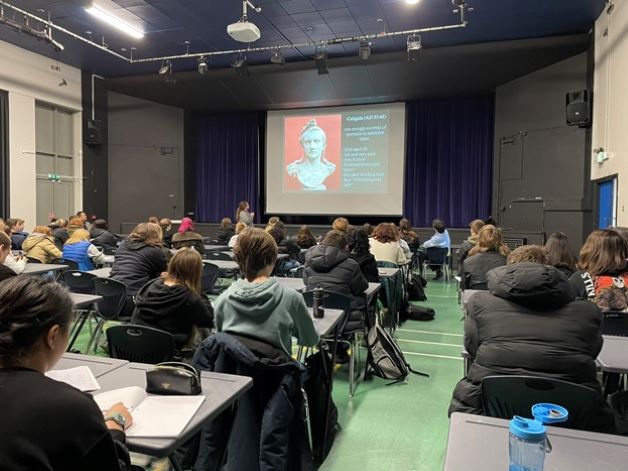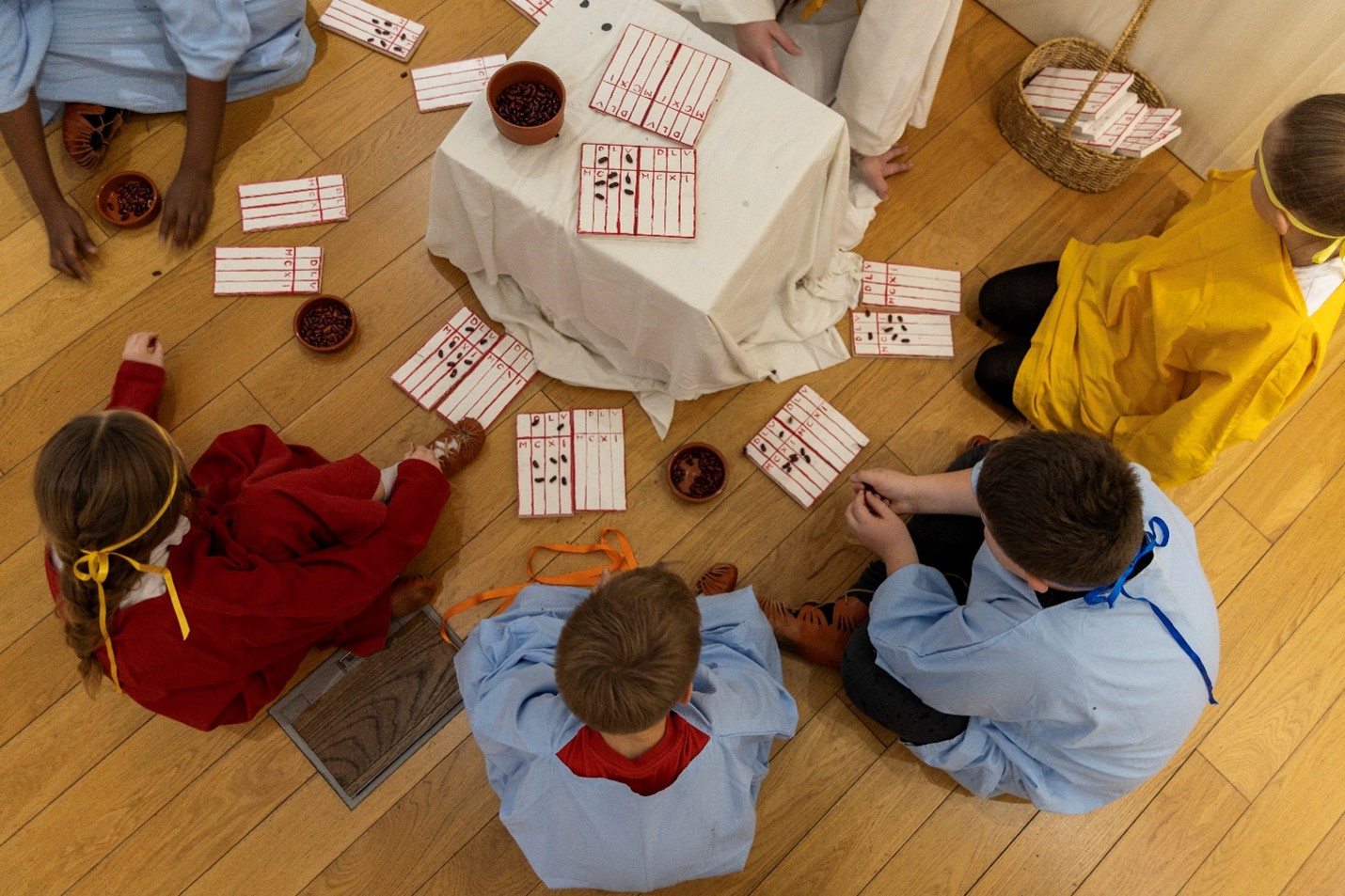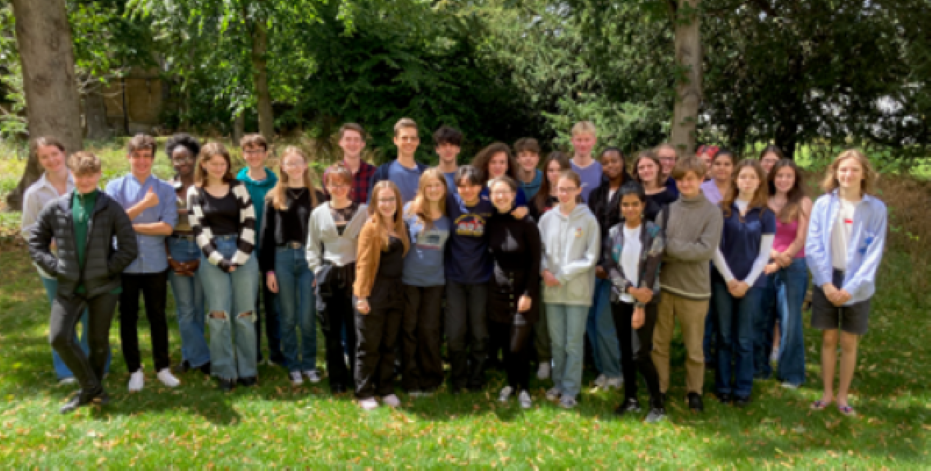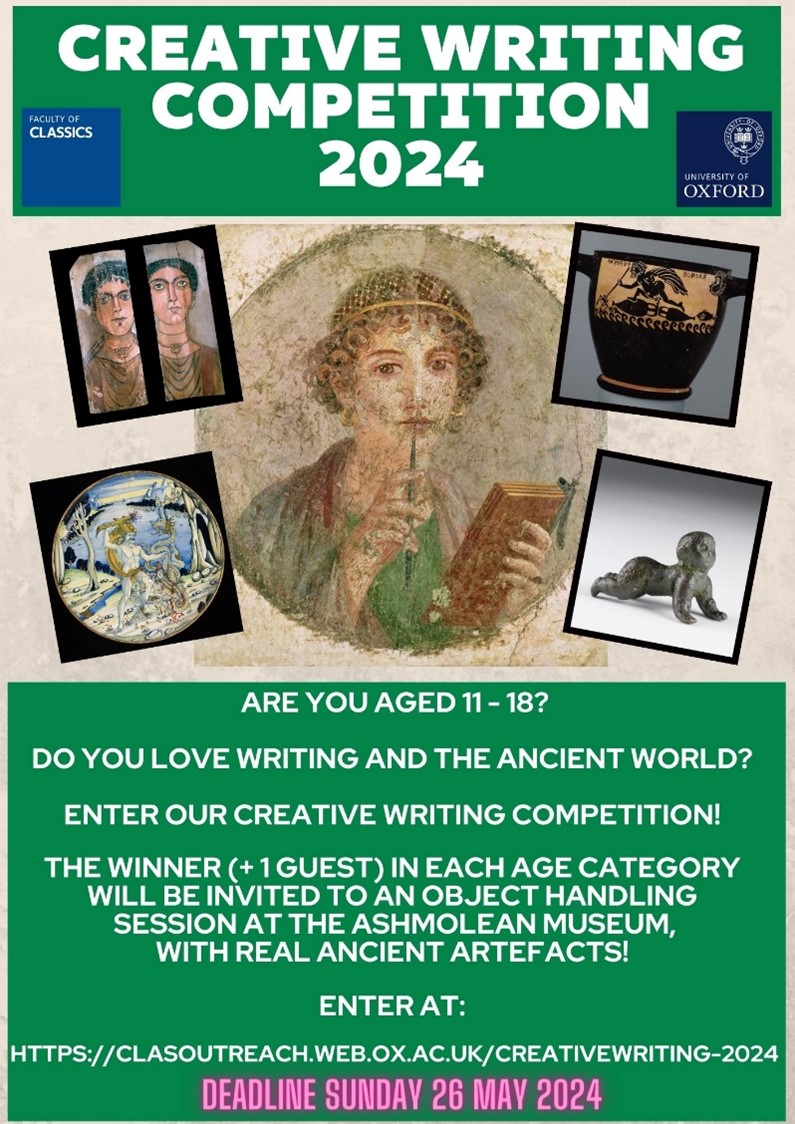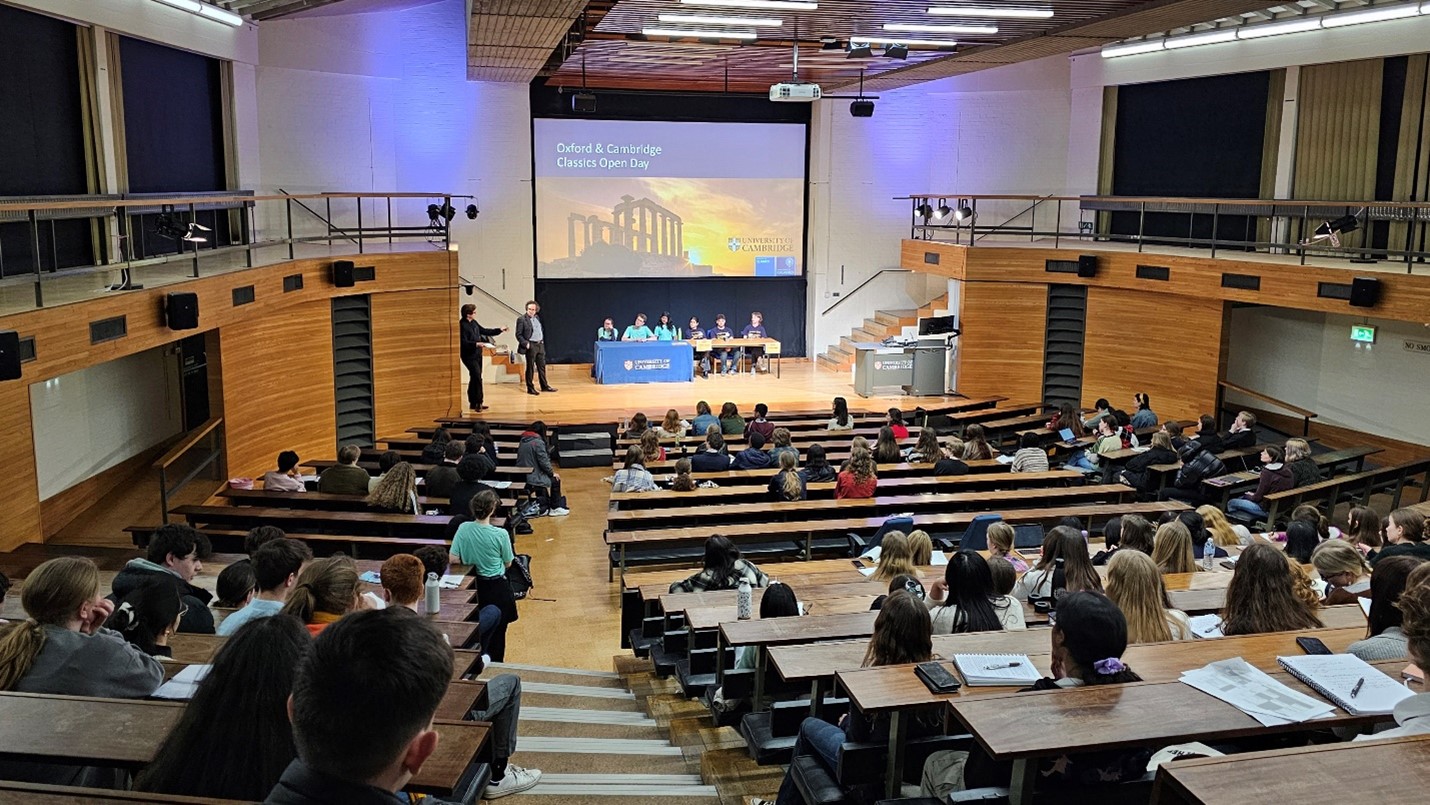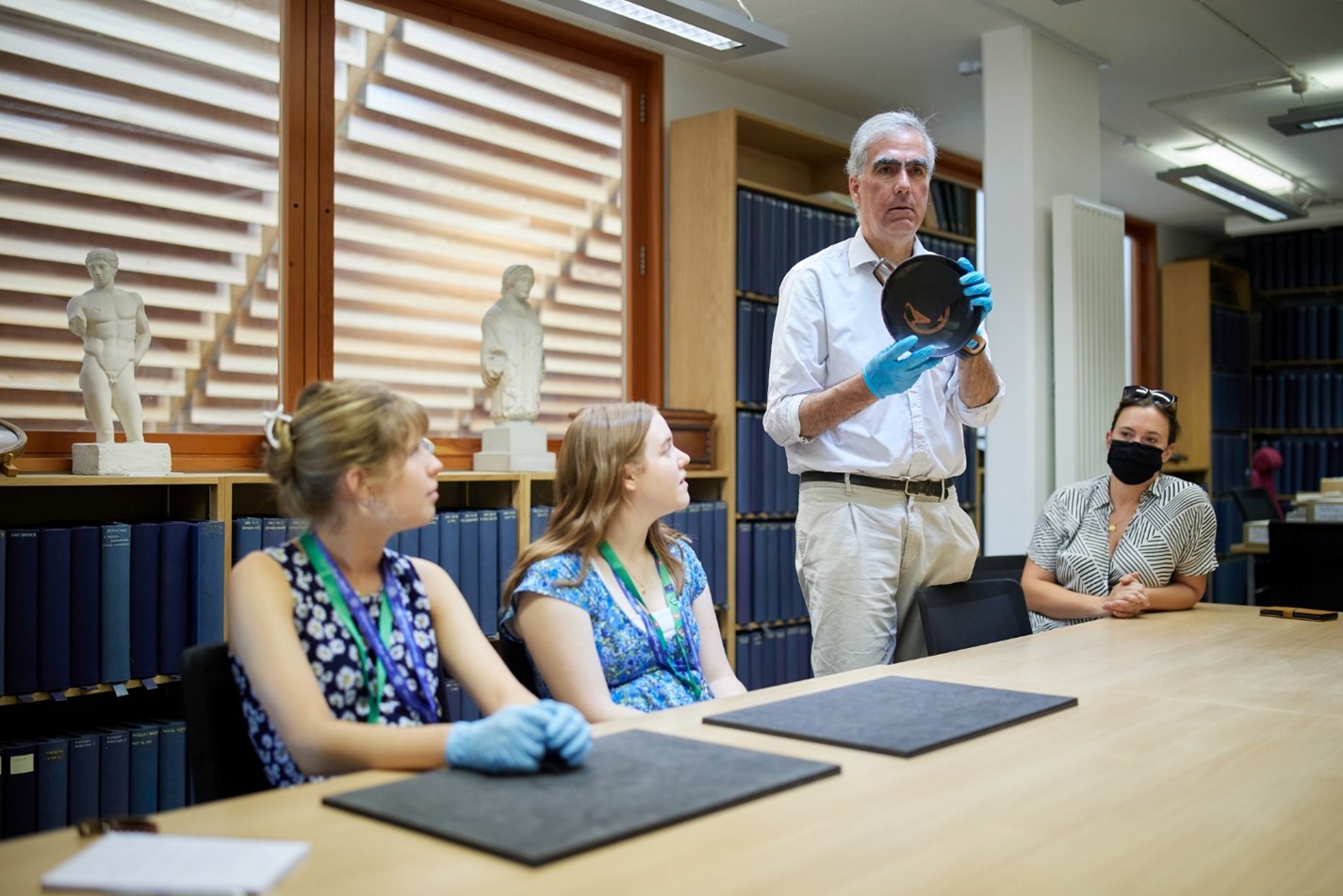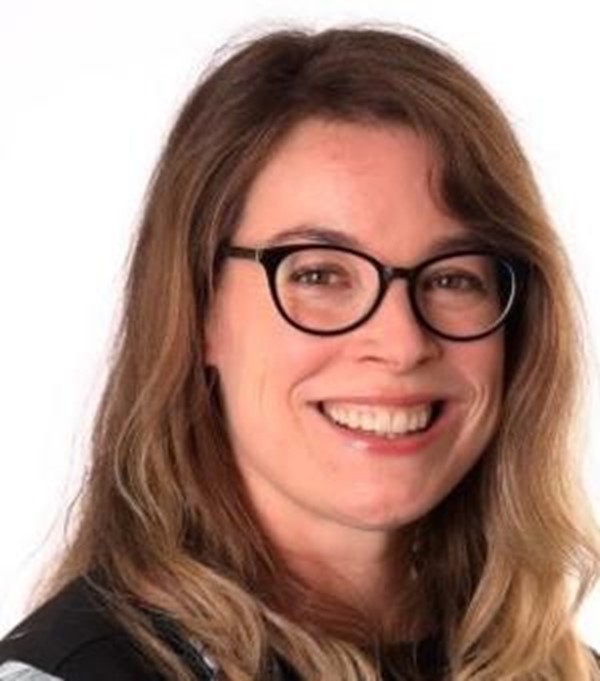In October 2023, the Faculty of Classics at the University of Oxford welcomed a brand-new Outreach Team: Dr Alison Pollard (formerly of the Ashmolean Museum and St John’s College) and Dr Andrew Sillett (of Brasenose College). Dr Pollard is a Classical Archaeologist and Dr Sillett is a specialist in the life and literature of Cicero.
Alison writes…
Our primary mission as the Outreach Team is to bring the Classical World to young people who might not be able to learn about it at school. For those who can, we aim to show that there are lots of fascinating aspects of Greek and Roman life to explore beyond what’s on the school syllabus. Because applicants to Oxford have a range of undergraduate Classics courses from which to choose – from Greek and Latin, to archaeology and ancient history, to philosophy (and much more besides) – we want young people to have every opportunity to hear and learn about them. We offer free outreach activities in all of these areas and can tailor them to different ages, group sizes and levels of experience and knowledge. Although many of our offerings are aimed at those who are starting to think about university applications, we hope to get children interested in Classics from the earliest stages of their school life.
Our most popular scheme is Classical Conversations, where schools can request an in-person or virtual talk from an Oxford academic on a subject of their choice. These take the form of mini-lectures or question and answer sessions, and are a friendly and relaxed way for young people to explore a topic in detail with an expert to bounce ideas around with. Some of the recent conversations led by the Outreach Team include:
‘Theory busting: the Greek sculptural revolution’
‘An idiot’s guide to toppling a dictator’
‘How to decorate a Roman house’
‘Who caused the fall of the Republic?’
‘Cancel culture? Damnatio memoriae in Roman art’
‘Shakespeare, Brutus and Caesar’
‘The archaeology of Roman Britain’.
We reach out to our colleagues in the Faculty of Classics and the Oxford colleges when we receive requests for talks in their particular specialisms, which in 2023-4 have covered:
‘Laughter in Greek Culture’
‘The Battle of Plataea: How to beat a Persian army’
‘Andromeda and Perseus’ in Ovid’s Metamorphoses’
‘Who was Greek tragedy for?’
‘Homer, Virgil and epic poetry’.
A new activity for us last year was the Ancient Schoolroom, which we were very happy to host at the Ioannou Centre for Classical and Byzantine Studies (the home of Classics at Oxford). This was organised in collaboration with Professor Eleanor Dickey and Nadine Marsovski from the University of Reading (https://readingancientschoolroom.com). For a week in early December, young people from local primary and secondary schools were invited to learn the Roman way in a re-created schoolroom, wearing Roman-style cotton tunics, organic leather sandals and hair ribbons. They used wax tablets, pottery fragments and counting boards to practise the type of exercises normally done in ancient schools. We hope to host another week of the Ancient Schoolroom in late 2024.
Together with Classics For All, we’re very keen to get Latin, Classical Civilisation, Ancient History and Archaeology on (or back on) the school curriculum and we’re working with teachers across the country to lend support in as many ways that we can. Since children start learning about the Romans in Britain from year three onwards, our colleague and former Schools Liaison Officer Dr Gail Trimble has developed and delivered an ‘Introductory Latin’ session for local primary schools and we’re keen to do more outreach activities for this age group. On Saturday mornings we run the OxLAT Latin Teaching Scheme, where a cohort of around 40 young people from state schools which don’t have any Latin provision can come to the faculty and study for their Latin GCSE from scratch. This has been running since 2008 (with a funding gap between 2012-2015) and has proved very popular, with over 90% gaining grades 7-9 in their final exam. A high proportion go on to Trinity College’s OxLAT extension programme, where they expand their existing knowledge of Latin and have an intensive course in Ancient Greek.
In spring and summer of 2024 we ran two new competitions which were open to everyone between the ages of 11 and 18. The first involved an exciting new collaboration with the Ashmolean Museum of Art and Archaeology, where young people were asked to submit a piece of creative writing based on a selection of archaeological objects from the ancient world. Categories were judged by Ashmolean curators and the winner in each age group won a trip to Oxford, where they (and a parent or guardian) took part in an exclusive ‘handling session’ at the Ashmolean, with genuine artefacts from ancient Greece and Rome! Our second competition challenged young people, in teams of one to three, to create a one-page comic strip based on their favourite Greek myth. The top 30 entries (which are still being judged, as of September 2024) will have their comic strips printed in a hardback graphic novel style book, with a copy sent to each winner. We received over 500 entries for our competitions this year, which makes it the most popular year in the history of Classics Outreach at Oxford! You can see the winning entries and competition details on the Competitions section of our website (details below).
March was a busy month for us with two major outreach events. The Classics Teachers’ Day brought teachers from schools around the country to the Ioannou Centre, where they heard the latest academic research on Homer, Vergil, Euripides, Ovid and Cicero. On Monday 18 March we took a team of 13 student ambassadors and 6 faculty members to Cambridge for the Oxford and Cambridge Classics Open Day. This is a yearly event which each institution takes turns to host (so it’ll be held in Oxford in March 2025). It gives young people an opportunity to find out about studying Classics at Oxford and Cambridge and to talk to current undergraduates, graduates and academics questions about student life, the courses on offer and the application and interview process. Along with subject stands, object handling tables and college tours, taster lectures were given by Professor Caroline Vout of Cambridge (Hercules’ thirteenth labour: from Rome to Cambridge North) and Dr Emma Greensmith of Oxford (Sisterhood in Ancient Literature). Around 400 people attended in person and those unable to make it to Cambridge could take part in online Q&A sessions.
On 26 and 27 June, and 20 September, we opened up the Faculty of Classics for the University of Oxford Open Days. We set up subject stands, gave a comprehensive admissions talk and there were lots of opportunities to chat with academics about studying all forms of Classics at Oxford. The Outreach Team were on hand for the entire day and gave taster lectures in their own academic specialisms. We were supported by our incredible team of student ambassadors (who we employ throughout the year) who shared their individual experiences of student life Oxford, and gave out our exciting new range of Faculty of Classics merchandise!
The annual UNIQ Ancient Greece, Rome and Classical Archaeology residential programmes ran again in June and July. Around 50 high-achieving young people from UK state schools, from socio-economic and educational backgrounds currently underrepresented at Oxford, spent three days in and around the Ioannou Centre learning all about the Classical World. The Outreach Team helps to coordinate each programme and brings together academics, museum curators, graduate assistants and student ambassadors to deliver lectures, tutorials, museum visits and object handling sessions – as well as all-important learning support – to the successful applicants. Faculty members who take part in the programme are always impressed by the quality of each year’s UNIQ cohort, many of whom go on to make successful applications to undergraduate study at Oxford (in Classics and several other subjects).
The Outreach Team’s aim for the next few years is to make contact with as many young people as possible to engage them in the Classical World, with the hope of widening the range of applicants to Oxford Classics. We’re fortunate that the faculty put serious resources into outreach: there are two of us in the team along with a Schools Liaison Officer (Dr Georgy Kantor), and a budget which allows us to employ student ambassadors and put on free activities for schools. Faculty members and student representatives are elected annually to the Outreach Committee, which meets once a term to discuss the outreach strategy for the coming year.
We are always open to new ideas and innovative ways that we can work with schools, after-school clubs, Classics hubs and similar organisations throughout the UK. Please sign up to our social media channels and get in touch if you’d like to take part in any of our existing activities, or would simply like to put your school in contact with the team.
Website: www.classics.ox.ac.uk/outreach
Email: [email protected]
Instagram: oxfordclassicsoutreach
Facebook: Faculty of Classics, University of Oxford
X: @oxfordclassics
Dr Alison Pollard is a Classical Archaeologist who was born in Accrington in Lancashire. She has taught several graduate and undergraduate courses in Greek and Roman art and archaeology at the University of Oxford since 2012. She specialises in Greek and Roman sculpture and the ways that Romans decorate their houses and villas, especially when scenes from mythology and epic turn up on the walls. Alison was a curator at the Ashmolean Museum for many years, working with the Roman, Greek and Arundel Collections (https://www.cloudtour.tv/ashmolean/the_arundel_marbles). More recently she has been identifying and cataloguing a range of archaeological material excavated from the Roman fort and neighbouring village at Binchester (ancient Vinovia) in County Durham (@RomanBinchester).
As Outreach Officer, Alison is the first point of contact for outreach-related enquiries for the Faculty of Classics at the University of Oxford. She is one of the designated Safeguarding Leads for the faculty and manages the OxLAT GCSE Latin teaching scheme.

